 Do you wonder whether you should be eating more organic foods?
Do you wonder whether you should be eating more organic foods?
Are you confused about what “organic” really means?
Before we go further, it’s important that we don’t lose sight of the big picture – to achieve good health and vitality, we should all…
eat REAL food, close to nature and mostly plants.
This way of eating – organic or not – will help you achieve a lower risk of heart disease, cancer and other illnesses, and will also help you enjoy a wide variety of flavorful and delicious meals.
Now, to the question we are frequently asked, “should I only eat organic?”
Our answer is…“It depends.”
In general, choosing organic is an excellent option and we consider buying organic as “taking your health to the next level.” However, we also realize it can be unrealistic for many people to only consume organic foods…and, in some cases, organic may not even be the best option.
Let’s break this down a little more…
What is organic?
 Organic food is regulated by the USDA and refers to a system of food production and processing that is designed to protect and improve our environment.
Organic food is regulated by the USDA and refers to a system of food production and processing that is designed to protect and improve our environment.- Organic producers must meet certain criteria relating to soil quality, pest and weed control, use of additives and animal raising practices.
- Foods must be produced in soils that are free from prohibited substances including synthetic fertilizers and pesticides, and do so for a period of 3 years before earning certification. This is why some produce is labeled “transitional” as they are in the midst of those three years.
- Genetically modified organisms (GMOs) are also prohibited in organic production and processing.
Is organic food healthier?
You might be surprised there are conflicting views on this. Why?
Remember, there are many variables that affect the nutrition of our foods. It’s very difficult for researchers to deal with all these variables to isolate a study down to the nutritional differences between organic and conventional foods.
That aside, we do know that organic foods are free from synthetic fertilizers, pesticides and GMOs. While organic foods can contain natural pesticides, these residues wash off your foods much easier and may not have the same harmful effects as the synthetic substances. So, from this perspective, organic food is the better option.
There are a number of studies that attempt to demonstrate the benefit of organic foods for the environment, producers and consumers. These studies show how organic foods reduce cancer risk, affect autism, and how they relate to infertility, while other studies discuss some of the qualitative differences between organic and conventional foods.
Are there certain foods that are more important to buy organic?
Updated each year and found at ewg.org, they list the produce that they’ve found to more likely contain pesticide residues, compared to those that consistently do not.
Some people find this to be a useful resource to help decide when to buy organic produce.
Organic claims on food packaging can be misleading. If you are looking for organic, the key is to look for the official USDA organic seal.
To use the seal, products must contain at least 95% organic ingredients. If it says “100% organic,” then 100% of the ingredients should be organic. If it says “Organic,” then it must meet the 95% threshold. If you see a label that says “made with organic ingredients” or “contains organic ingredients,” these foods don’t meet the 95% threshold and aren’t able to use the official USDA organic seal.
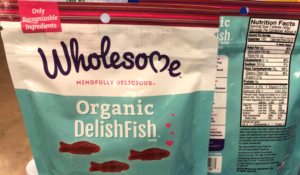 Organic junk food is still junk food.
Organic junk food is still junk food.
Just because it’s organic doesn’t mean it’s necessarily good for you. If you go to the store today, you can buy organic cookies, chips, crackers, ice cream, candy and much more.
The manufacturers may include organic ingredients and use organic references on the label to create a “health halo.” However, these foods are still highly processed and a diet of highly processed organic foods will not lead to materially better health than a diet of highly processed conventional foods. For example, these Organic “DelishFish” have 27 grams of sugar (almost 7 tsp) in just seven pieces!
Is the cost worth it?
The good news is the cost difference between organic and conventional foods is narrowing, especially for certain types of food. For example, we routinely find the organic kale at our local store to be the same price as the conventional variety. While this is good news, it’s still more expensive to eat exclusively organic foods. So, here are a few tips:
- Avoid the temptation to say, “if I can’t afford organic produce, I’m not going to eat it at all.” The National Cancer Institute has found that people who eat more fruit and vegetables – with or without pesticides – have a lower risk of cancer, heart disease, diabetes and Alzheimer’s.
- Look in the frozen aisle. Organic frozen produce can be just as nutritious and often comes at a lower price point, especially when the fresh varieties aren’t in-season.
- Buy in bulk. Big box stores like Costco and Sam’s often sell organic foods (such as quinoa), so buying certain foods in bulk can be a good option.
- Prioritize. You can focus on paying a little more for the foods on the Dirty Dozen list or the foods you eat the most, and then worry less about paying more for the foods on the Clean 15 list or the foods you buy less frequently.
- Consider store brands. Many stores offer their own private label brands, which can be more cost effective than the name brands.
What about farmers’ markets?
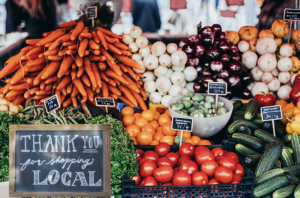 Even farmers who sell at the farmers’ markets are required to be certified by the USDA in order to use the “organic” claim. For a local farmer, this can be an expensive and time-consuming process. So, it’s possible the farmer may actually use organic practices, but can’t officially call their food “organic” because they haven’t gone through the certification process. Or they may be transitional, as stated above.
Even farmers who sell at the farmers’ markets are required to be certified by the USDA in order to use the “organic” claim. For a local farmer, this can be an expensive and time-consuming process. So, it’s possible the farmer may actually use organic practices, but can’t officially call their food “organic” because they haven’t gone through the certification process. Or they may be transitional, as stated above.
This is one of the reasons we love the farmers’ market so much! We can ask the farmers how they grow their produce and can even visit their farms to see it first-hand. When we have the choice, we strongly prefer buying from a local farmer who uses organic practices (even if they are not certified) vs. buying the certified organic variety from the store. The local produce was likely harvested within the past day or two, while the variety in the store has likely traveled 1,000 miles or more over the course of days or weeks before finally reaching the store. This means the flavor and nutrients will be far superior to the store option, and of course, better for the environment too.
The bottom line…
 Remember, the first priority is REAL food.
Remember, the first priority is REAL food.
Then, buying organic can take your health to the next level. And, buying from local farmers who use organic practices (even if not certified) is a fantastic option.
REAL food – especially organic – is great for people and the environment and the more we buy, the more the market will produce!
If you are intrigued and want to read more:

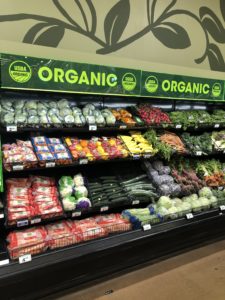
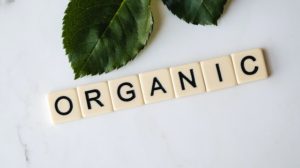
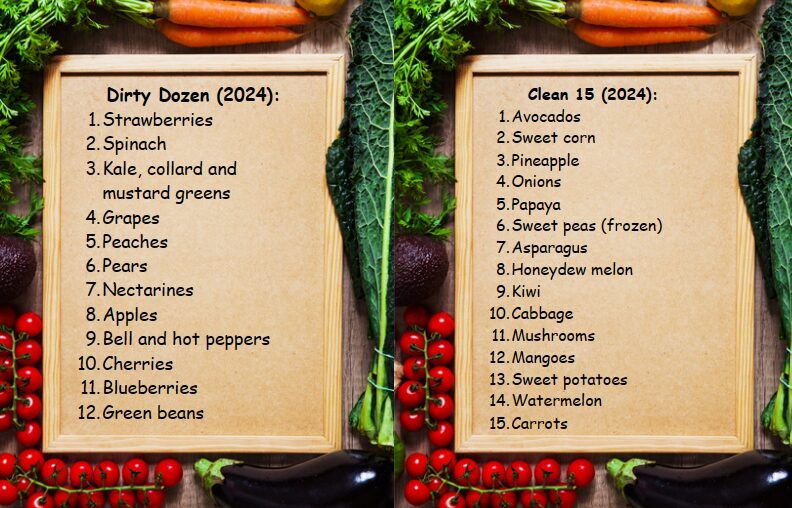
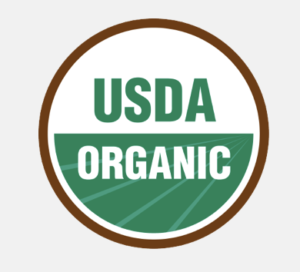
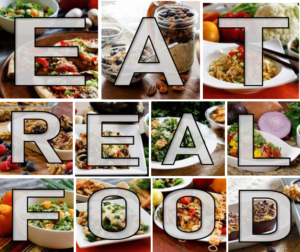
I love farmers’ markets and roadside farm stands. We grow a big garden in summer with a huge variety of veggies. Can’t wait to plant. I miss picking dinner!
We do too! Now that Spring is here we are also anxiously awaiting garden produce — can’t wait! Thank you for sharing!
Great article, I totally agree that the bottom line is MORE REAL FOOD! Sometimes I make my decision based on cost and sometimes on Health. Everyone is on a Journey with Health and Wellness, we are all at a different place, food is not about right and wrong, but it is about making the best decision for you and your Journey. Love your tips each week, I think our class has learned a lot from our discussions.
You are absolutely right! Thank you for the inspiring feedback – and it is so true, the key is to keep it simple and eat REAL food!
Your tip was very informative I often wondered what organic meant now I know thank you
This is great information! I printed out the graphic to tuck in my wallet to refer to when I’m shopping. Next you’ll have to tackle things like grass-feed beef, organic milk, free range chicken! Is it worth buying organic varieties of canned goods, such as broth, beans, maple syrup, etc?
Thank you so much for the feedback and suggestions — we will get working on it!